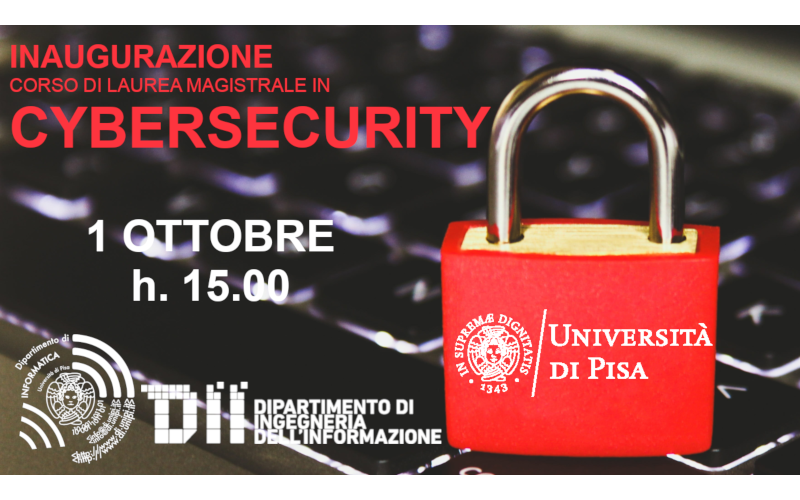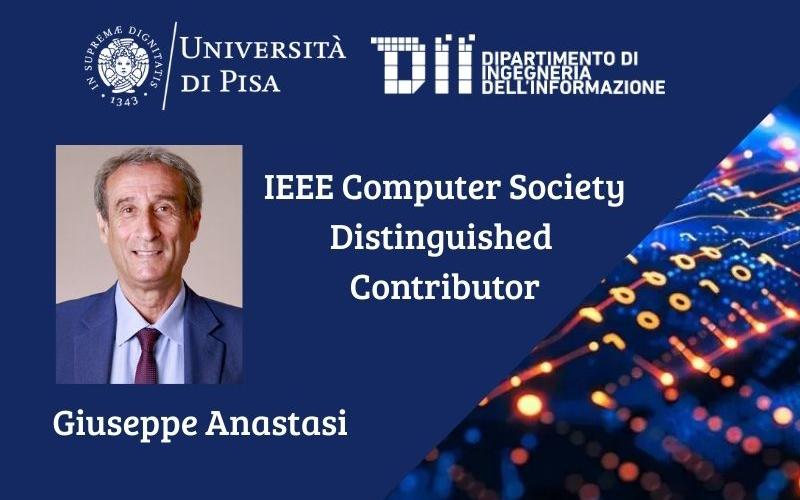La nomina a Distinguished Contributor (DC) premia i membri e gli affiliati della Computer Society che hanno apportato contributi tecnici significativi e continuativi alla IEEE Computer Society, alla...
Leggi tuttoInaugurazione Corso di Laurea Magistrale in Cybersecurity

Inaugurazione del nuovo Corso di Laurea Magistrale in Cybersecurity
Streaming a partire dalle 15.00 del 1 ottobre al link http://call.unipi.it/inaugurazionecybersecurity
Programma
| 15:00 | Interventi Istituzionali |
| Paolo Mancarella, Rettore Università di Pisa Albino Caporale, Direttore Attività Produttive, Regione Toscana Paolo Pesciatini, Assessore all’Innovazione, Comune di Pisa Giuseppe Anastasi, Direttore Dip. Ingegneria dell’Informazione, Università di Pisa Gianluigi Ferrari, Direttore Dip. di Informatica, Università di Pisa |
|
| 15:40 | Presentazione del Corso di Laurea Magistrale in Cybersecurity |
| Stefano Chessa, Dipartimento di Informatica, Università di Pisa | |
| 16:00 | Keynote: Architettura Nazionale Cyber |
| Roberto Baldoni, Vice Direttore Generale per la Cybersecurity, Dipartimento delle Informazioni per la Sicurezza (DIS), Presidenza del Consiglio dei Ministri | |
| 16:30 | Keynote: Come cambia la sicurezza informatica ai tempi del COVID |
| Giuseppe Vaciago, esperto di nuove tecnologie e digital forencsis | |
| 17:00 | Keynote: Attribute-based Authentication and Signing |
| Bart Jacobs, Nijmegen’s Interdisciplinary Hub for Security, Privacy and Data Governance, Netherlands | |
| 17:30 | Discussione |
Speakers
Roberto Baldoni is on leave from University of Rome La Sapienza acting currently as Deputy Director General at Presidency of Ministry Council of Italy in charge of National Cybersecurity.
Roberto Baldoni conducts research (from theory to practice) in the fields of distributed, pervasive and p2p computing, middleware platforms and information systems infrastructure with a specific emphasis on dependability and security aspects . He is the founder of MIDdleware LABoratory (MIDLAB) and he has been PI of many national and international research projects for a overall funding of over 20 Millions euros.
Giuseppe Vaciago è un avvocato esperto di diritto penale delle nuove tecnologie e diritto penale societario. Ha prestato la sua attività professionale per alcune importanti società nazionali e internazionali nel settore dell’information technology. Ha conseguito nel 2011 un PHD in Scienze Giuridiche all’Università degli Studi di Milano Bicocca affrontando il tema della Digital Forensics e delle investigazioni digitali. È docente di informatica giuridica presso l’Università degli Studi dell’Insubria dal 2007. Ha frequentato in qualità di Visiting Scholar la Stanford Law School e la Fordham Law School di New York. È fellow presso il Nexa Center di Torino e presso il Cybercrime Institute di Colonia. È membro del comitato editoriale della Rivista Digital Investigation edita da Elsevier. È autore di numerose pubblicazioni di carattere universitario tra cui “Computer Crimes”, “Digital Forensics” e “Modelli di organizzazione gestione e controllo ai sensi del D.Lgs. 231/01”.
Bart Jacobs is a professor of computer security, privacy and identity at Radboud University Nijmegen, The Netherlands. His work covers both theoretical computer science and more practical, multidisciplinary work, esp. in computer security and privacy. Jacobs is a member of the Academia Europaea and of the Royal Netherlands Academy of Arts and Sciences (KNAW), and a recipient of an ERC Advanced Grant. He is an active participant in societal debates about security and privacy, in the media and in various advice roles e.g. for government and parliament. He chairs a non-profit spin-off on attribute-based identity management (see irma.app) and is co-founder of Nijmegen’s interdisciplinary hub on security, privacy and data governance (ru.nl/ihub). For more information, see: http://www.cs.ru.nl/~bart/.
Abstract degli interventi
Titolo: Come cambia la sicurezza informatica ai tempi del COVID
Speaker: Giuseppe Vaciago
Abstract: In questo intervento vorrei dare un breve spaccato dello scenario legale e strategico di molte aziende che hanno dovuto gestire l’emergenza COVID implementando attraverso lo smart/remote-working sistemi di compliance in tempi brevissimi e durante uno stato emergenziale di notevole portata. La conseguenza è stato l’incremento di scenari di rischi cyber che non sono ancora stati completamente “metabolizzati” e che potrebbero palesarsi nei prossimi mesi qualora non si proceda con tempestività ad una messa in sicurezza sia dal punto di vista tecnologico che dal punto di vista di policy aziendali.
Titolo: Attribute-based Authentication and Signing
Speaker: Bart Jacobs
Abstract: This presentation will describe the ideas behind the identity platform IRMA, with the corresponding IRMA app. IRMA is open source, internationally available (see Andriod and iOS app stores) and operated by a non-profit foundatioun. IRMA offers first of all attribute-based authentication. This means that users can show, for instance, that they are over 18 without revealing anything else about themselves. IRMA offers also attribute-based signing: it allows users to digitally sign documents, with several attributes. A verifier of the resulting signed document can cryptographically check that the document was signed by someone with these attributes. In this way a medical doctor can sign, for instance, a recipe with his/her medical credentials, as attributes.
IRMA has a decentralised architecture, in which attributes only exist in digitally signed form on a user’s phone. This means that is well-suited for international (cross-border) usage, since only public keys are needed — and no complicated internationally connected infrastructure.
The presentation contains the essence of how IRMA works and of IRMA’s guarantees. It also gives an overview of where IRMA is currently being used.



